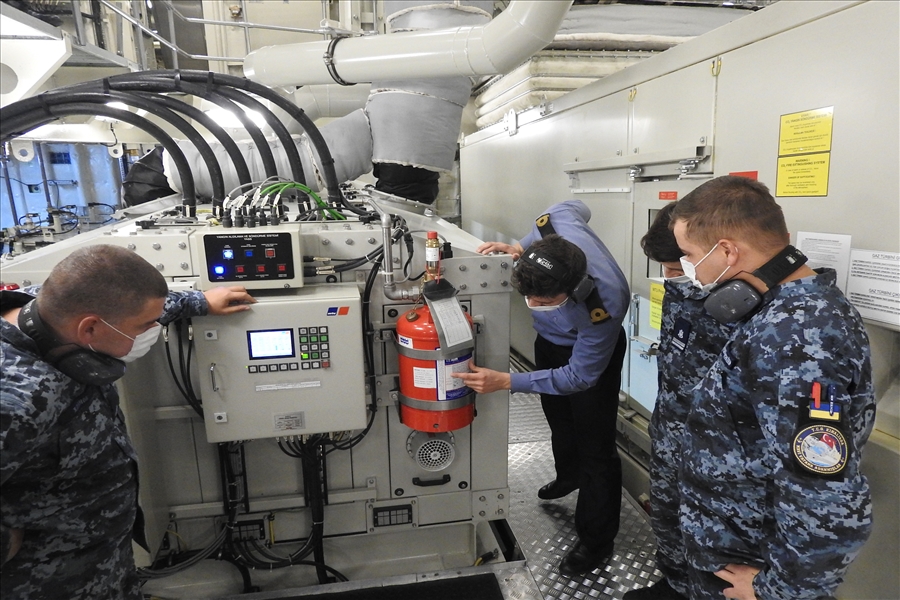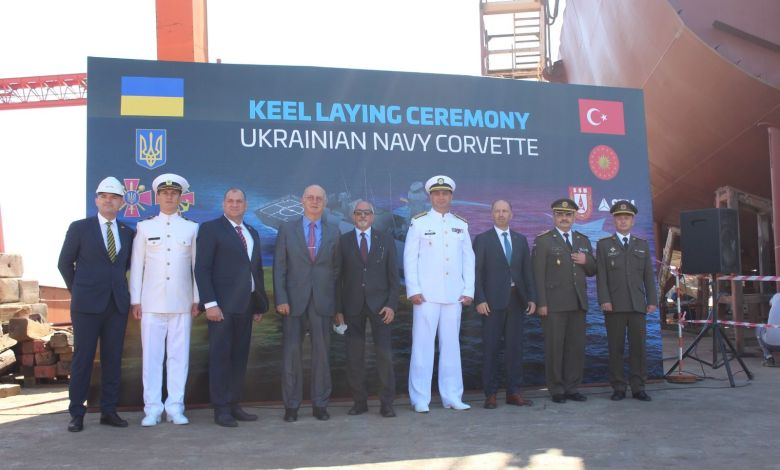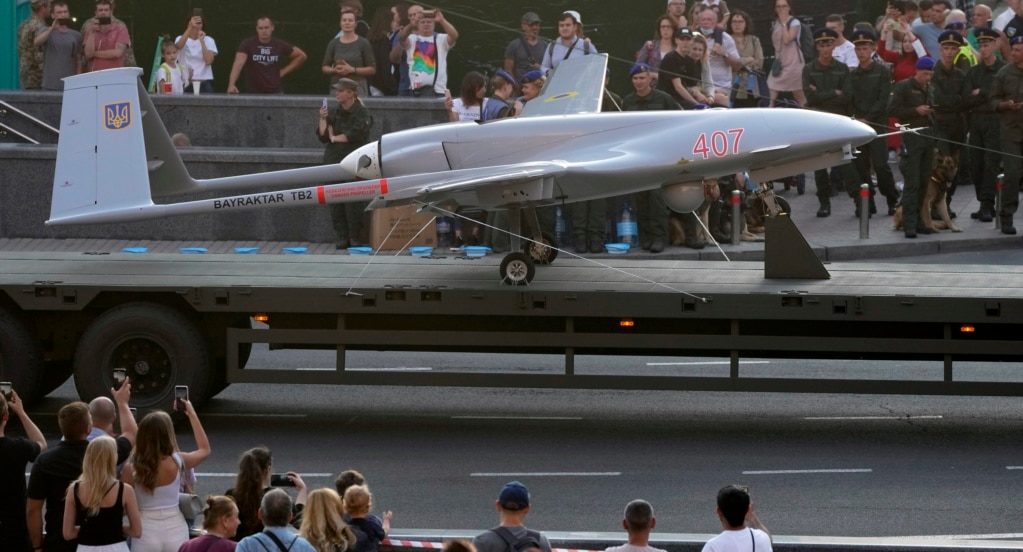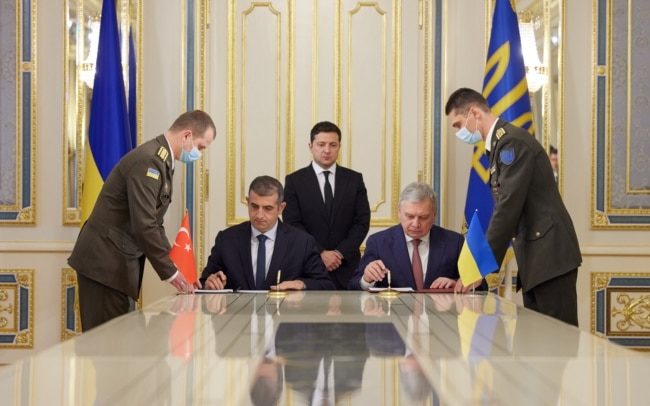Levent Kenez/Stockholm
The Turkish Defense Ministry on Tuesday announced that Ukrainian Naval Forces Command personnel were given “Navy Internship” training on a Turkish corvette, in a statement in which detailed information was not provided, but only photographs of the Ukrainian sailors. The announcement coincided with Russia expressing increasing discomfort with Turkish-Ukrainian military cooperation following a Turkish-made drone attack against Russian-backed forces in eastern Ukraine last week.

Turkey and Ukraine have recently signed several agreements to increase cooperation in the economic and military fields. Nordic Monitor obtained the latest Framework Agreement on Military Cooperation signed by Turkish Defense Minister Hulusi Akar and his then-counterpart, Andrii Taaran, in October 2020 that allows Ukrainian military personnel to receive training in Turkey or vice versa. With the agreement, the armed forces personnel and military students of the two countries will be able to exchange visits for military education and training. Among the areas of cooperation is the exchange of intelligence. The military intelligence clause of the agreement covers the exchange of military intelligence about countries that are considered to be harmful to the mutual interests of Turkey and Ukraine.
In addition to personnel training, the two countries will also cooperate in arms sales. In February pro-government Turkish media outlets reported that three corvettes for the Ukrainian navy will be built in a collaboration between Turkish and Ukrainian shipyards. According to the reports the first of the corvettes is to be built in Turkey, while the rest are to be produced in Ukraine. The project is to produce an “Ada-class” corvette, an anti-submarine vessel developed for the Turkish Navy as a part of a national warship program called MİLGEM. According to the official information, the Ada-class corvette is designed to offer anti-submarine warfare and high-seas patrol capabilities. Turkey has produced four of this class of corvettes so far. It is no coincidence that the Kınalıada corvette, the warship on which Ukrainian naval personnel were trained this week, is one of this class of corvettes. There are signs that the cooperation between Turkey and Ukraine will continue, especially regarding the Black Sea. Ukrainian Foreign Minister Dmytro Kuleba last week penned an article for The Atlantic Council claiming that there is a strong argument to be made for enhanced maritime cooperation between NATO and Ukraine in the Black Sea, a reason why Turkey is willing to strengthen its naval posture in the region and is currently engaged in enhancing security cooperation with Ukraine.

As a side note, Ukraine is one of several countries monitoring an 11-day naval exercise called Eastern Mediterranean 2021 that was launched by Turkey on Monday with personnel from 10 countries taking part.
Undoubtedly, Russia is the country most disturbed by the military cooperation between Turkey and Ukraine. In April Russia warned Turkey against Ankara’s efforts to boost cooperation with Kyiv. In an interview with the Argumenty i Fakty newspaper, Russian Foreign Minister Sergey Lavrov said, “We strongly recommend that our Turkish colleagues carefully analyze the situation and stop fueling Kyiv’s militaristic sentiment,” which could be interpreted as a threat. “We hope Ankara will adjust its line based on our legitimate concerns,” he added.

Meanwhile, on October 23 Ukrainian state television broadcast a video showing a Turkish-made military drone used against Russian-backed forces in the eastern Donbass region. The Kremlin said the following day that its fear about Turkey’s decision to sell strike drones to Ukraine was being realized and that the Turkish drones risked destabilizing the situation in eastern Ukraine, while Ukrainian President Volodymyr Zelensky told the press last Friday that the use of Turkish strike drones in the conflict in the eastern Donbass region is defensive and does not violate any agreements.
However, Turkey claims it has no responsibility for how the drones it sells are used. “If a country buys them from us, they are no longer Turkish,” Foreign Minister Çavuşoğlu told reporters after he met with his Russian counterpart Lavrov on Saturday at the G20 summit in Rome.
“Perhaps Turkey has produced it, but it belongs to Ukraine.”he said. Nevertheless, he also called on Ukrainian authorities to stop referencing Turkish drones or Turkey when speaking of the drones.
Tensions with Russia over Ukraine poses a great threat to Turkey’s military presence in Syria on the eve of preparations for a unilateral military operation in the north of the country. Russia has been pressuring Turkey for a complete withdrawal from Syria for a while, and the tensions in the Black Sea may accelerate this process.
In January 2019 Ukrainian state-owned Ukroboronprom, an association of multi-product enterprises in the defense industry, announced an agreement between Turkish company Baykar Makina, which produces Bayraktar TB2 drones, and Ukraine’s state-owned arms trader Ukrspecexport (a part of Ukroboronprom) to buy 12 Bayraktar TB2s for $69 million. According to the Turkish media, the purchase agreement includes three ground stations and the training of personnel. The first group of drones was delivered to Ukraine the following year.

In 2020 Turkey promised to finance the purchase of goods and services to meet the needs of the Ukrainian Armed Forces in the amount of more than 200 million Turkish lira (equivalent to about $21 million now).
It is no secret that Turkish President Recep Tayyip Erdoğan, his family members and his business associates benefit immensely from the defense industry and military goods sales. Bayraktar, the company that produces military drones, belongs to Erdoğan’s son-in-law Selçuk, and his company not only takes advantage of all state facilities but also earns high profits in the local and international market with the sale of weapons, for which the only decision-maker is his father-in-law. An important reason for choosing Turkish drones is that Turkey does not have a long export approval process, unlike the US and the European Union.












